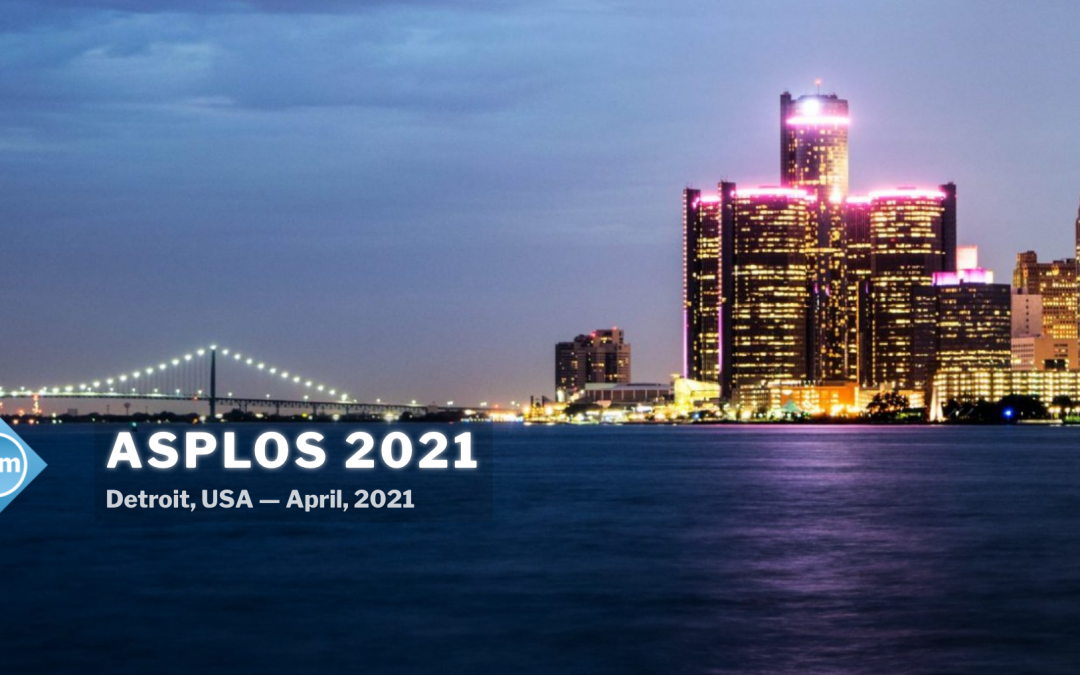ASPLOS 2021
August 14, 2020
August 21, 2020
The 26th International Conference on Architectural Support for Programming Languages and Operating Systems (ASPLOS 2021)
Detroit, USA
April, 2021
Submissions Due: August 21, 2020
https://asplos-conference.org/
https://asplos21.hotcrp.com/
ASPLOS is the premier forum for multidisciplinary systems research spanning computer architecture and hardware, programming languages and compilers, operating systems and networking. The 26th ASPLOS will be held in Detroit, Michigan (USA), a.k.a. Motor City, the historic heart of America’s automotive industry and the birthplace of Motown Records.
Like its predecessors, ASPLOS 2021 invites papers on ground-breaking research at the intersection of the ASPLOS disciplines: architecture, programming languages, operating systems, and related areas. Non-traditional topics are especially encouraged. The importance of cross-cutting research continues to grow as we grapple with the end of Dennard scaling, the explosion of big data, scales ranging from ultra-low power wearable devices to exascale parallel and cloud computers, the need for sustainability, and increasingly human-centered applications. ASPLOS embraces systems research that directly target new problems in innovative ways. The research may target diverse goals, such as performance, energy and thermal efficiency, resiliency, security, sustainability, applicability to future technologies, applications, and environments. The review process will be sensitive to the challenges of multidisciplinary work in emerging areas.
Areas of interest include, but are not limited to:
- Existing and emerging platforms at all scales (embedded to cloud)
- Internet services, cloud computing, and datacenters
- Multicore architectures and systems
- Heterogeneous architectures and accelerators
- Systems for enabling parallelism at extreme scale
- Programming models, languages, and compilation for all platforms
- Managing, storing, and computing on big data
- Virtualization and virtualized systems
- Memory and storage technologies and architectures
- Power, energy, and thermal management
- Security, reliability, and availability
- Verification and testing, and their impact on design
- Support for approximations and approximate computing
- Non-traditional computing systems, including emerging devices
Deadlines
Paper registration: August 14, 2020
Full paper submission: August 21, 2020
Author response: November 4-6, 2020
Notification: November 19, 2020
Final paper deadline: February 1, 2021
ASPLOS’21 Extended Abstracts
In the past decade, our community has grown considerably both in the number of researchers and the number of institutions involved. While this is a wonderful development for our field, the corresponding growth in conference submissions is stressing our paper review processes. The increasingly larger program committees (PC) and multi-day PC meetings have not been sufficient to address the problems. PC members complain about excessive reviewing workloads and long PC meetings where they rarely talk. Authors routinely complain about low quality of reviews and inconsistent review outcomes.
We believe the key to high quality review outcomes and an overall high quality program is to involve more PC members with the review and decision for each paper. To allow for that in the presence of record submission counts (almost 500 for ASPLOS’20), we will pilot the use of extended abstracts in ASPLOS’21. Each paper submission must be accompanied by a 2-page extended abstract that summarizes the motivation, key insights, main artifacts, and important contributions (see this template for suggested structure). The extended abstracts are inspired by the familiar submission format for the yearly IEEE Micro Top Picks issue.
Here is how extended abstracts will help in the reviewing process:
- We will use the extended abstracts in the first round of reviewing (R1). We expect each abstract to be reviewed by 4 or more PC members (plus additional external reviewers) and each PC member will review 4x to 5x more abstracts than papers in a traditional R1. We hope that more PC reviews per submission and better calibrated PC members will lead to better R1 decisions. Contrast this to recent ASPLOS conferences, where some papers were rejected in R1 with 1 or 2 PC reviews.
- We will use the extended abstracts to increase the number of informed participants in the PC meeting. Ahead of the PC meeting, we will ask PC members to read a few additional extended abstracts and 1-page review summaries for submissions in their area. This will allow us to quickly bring further expertise into the discussion for challenging submissions. We will also allow any PC member to access extended abstract and review summaries. That way, we hope to avoid what is common in PC meetings, where a disagreement by the 3 PC reviewers is resolved with a vote by uninformed and uncalibrated PC members.
The PC members may suggest other uses for the extended abstracts throughout the review process.
We are excited to measure and understand how extended abstracts can improve our reviewing process. Along with other experiments, such as multiple submission deadlines throughout the year, they can help us achieve high quality paper review and selection as our community grows.
Christos Kozyrakis & Emery Berger
PC Co-chairs, ASPLOS’21

